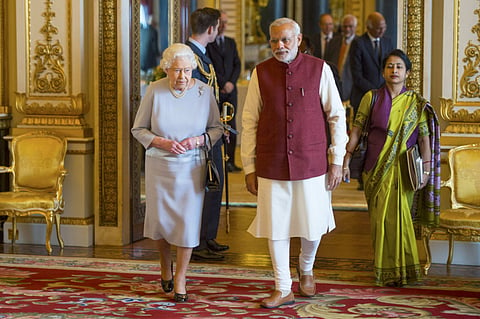The Modi delusion is still very much intact
No one can take away the Indian prime minister’s persistent efforts to bring capital into India

Richard Dawkin’s best seller ‘The God Delusion’ was a strong denunciation of faith and religion, yet there’s been no drop in the number of churchgoers. Watching British Prime Minister David Cameron at Wembley last Friday, it appears ‘The Modi Delusion’ at least is intact in Britain, despite the Bihar election results and all that has happened recently in India. The print media in the United Kingdom covered Indian Prime Minister Narendra Modi’s visit extensively, except for the BBC, for which, perhaps, the horrific Paris attacks posed programming challenges.
What is worth scrutiny, however, is Cameron’s slavish praise of Modi and his ringing endorsement of the “achhe din” (better days) slogan that has lost much of its lustre in India.
Writer Pankaj Mishra and sculptor Anish Kapoor were scathing in their attack on Modi in the Guardian, but the country laid out the red carpet and parroted Modi’s many promises. Indeed, the Speaker of the House of Commons, John Bercow’s, fulsome praise while introducing Modi was not only craven but factually incorrect. He told his audience that Modi must be honoured for having created hundreds of smart cities. Pray, where are these smart cities? If the Speaker can be misinformed, imagine the Modi supporters.
All of this also forces us to question our understanding of public diplomacy or at least the traditionalist’s view of it. When has it become de rigueur to so blatantly engineer a state visit by the host country’s ruling establishment purely to bolster its standing with its minority community interests? More than 1.2 million people of Indian origin live in the UK and the Labour Party has traditionally had a strong hold on it despite some selected senior members’ support of other Asian interests in the UK that are inimical to India, particularly immigrants from Pakistan-administered Kashmir’s Mirpur district.
Now the Tories want a piece of the action and have decided to play the Gujarati card. Quite possibly, a large chunk of that Wembley audience consisted of the Patels, Shahs and Mehtas who returned penniless from East Africa and made good on English shores. Undoubtedly, many others, apart from Gujaratis, also attended the Wembley event. Mishra talked of packed stadiums of ecstatic Indians around the world who attend these mass gatherings fervently believing the cruelly postponed glory of ancient India is now imminent and that none other than Modi, the great Mahdi the redeemer, will finally deliver them to the promised land. Delusional perhaps, but the numbers are impressive.
So are we being fair to the man?
One may cavil with his understanding of India and his peculiar habit of only talking of tolerance abroad and his inability to rein in his intolerant supporters, which is totally unforgivable. But despite this fatal flaw, who can deny that he has single-handedly re-energised the India story, which had lost much of its sheen and narrative under the previous Congress governments. Yes, he has a weakness for gimmickry and Bollywood-style outreach programmes to attract interest in India. Yes, a lot of his utterances lack conviction because, on the ground, precious little has changed. But no one can take away his persistent efforts to bring capital into India.
Great contributions
As a prime minister, Modi is the ultimate enabler. Beyond that, what can one man do? Yes, his detractors are partially right in the sense that instead of launching 100 new initiatives he should focus on the key ones. But the man has energy and is committed to his cause. Though his critics would immediately say his cause is to himself and not to his country or to Bharatiya Janata Party — his party.
One of his other great contributions is to have co-opted the Indian diaspora like no other prime minister has done so far. Indians living abroad have a reawakened self-awareness, namely that they are as much an integral part of this great nation-building project as the resident Indians.
The nuclear deal, though done under the Congress government, was greatly facilitated by Indians living abroad. Modi has simply upped the ante on this strategy. Also, however much the Liberals may deride these mass gatherings at Madison Square Gardens and other avenues, it is a naked display of Indian strategic outreach. Something not lost on the US or UK, Europe or Pakistan. Modi may be crass in his methods, with his constant change of attire, outlandish head gear and Bollywood-style extravaganzas to pull in numbers for his speeches, but it has been effective. Barack Obama, Cameron and former Canada prime minister Stephen Harper were seemingly bedazzled by his ability to pull in the crowds.
As he gets back to India after the G20 summit, Modi has much to ponder. The Bihar fiasco, the BJP veterans’ revolt, his consigliore Amit Shah’s future. He will also have to think hard on whether he tones down his rhetoric and makes sincere overtures to the opposition to broker his many unfinished pieces of legislation. Sadly, it is not in his nature to build a consensus, a fatal flaw for which he, his nation and the BJP will pay.
Ravi Menon is a Dubai-based writer working on a series of essays on India and on a public service initiative called India Talks.
Sign up for the Daily Briefing
Get the latest news and updates straight to your inbox



